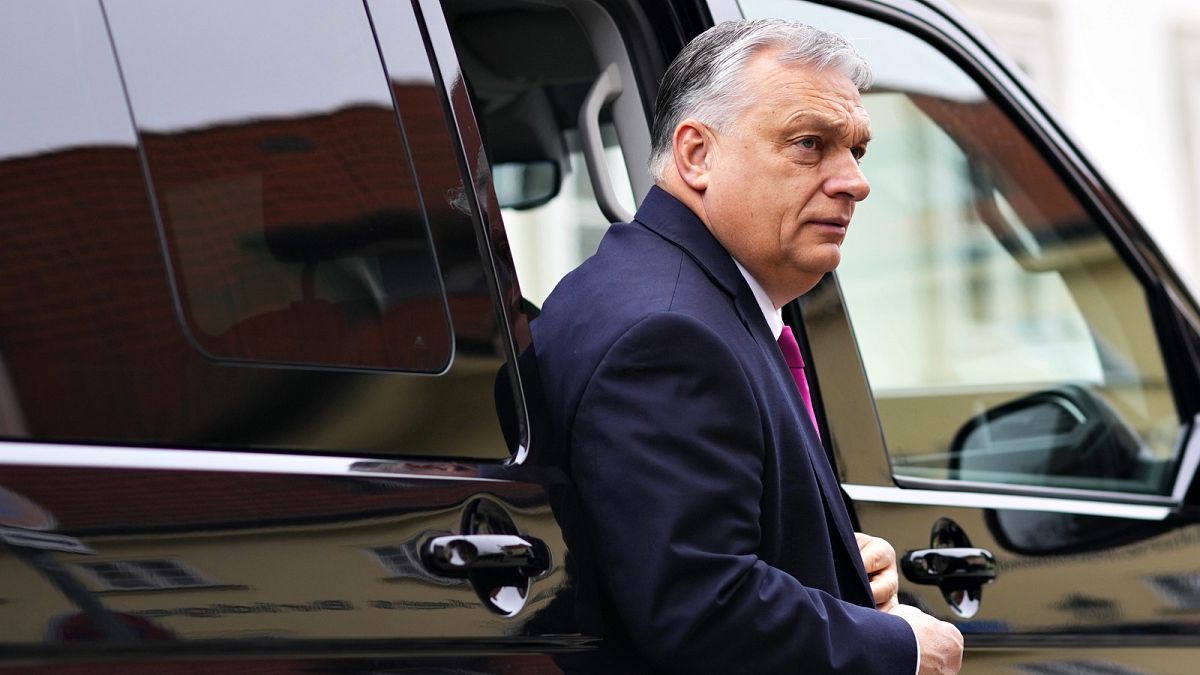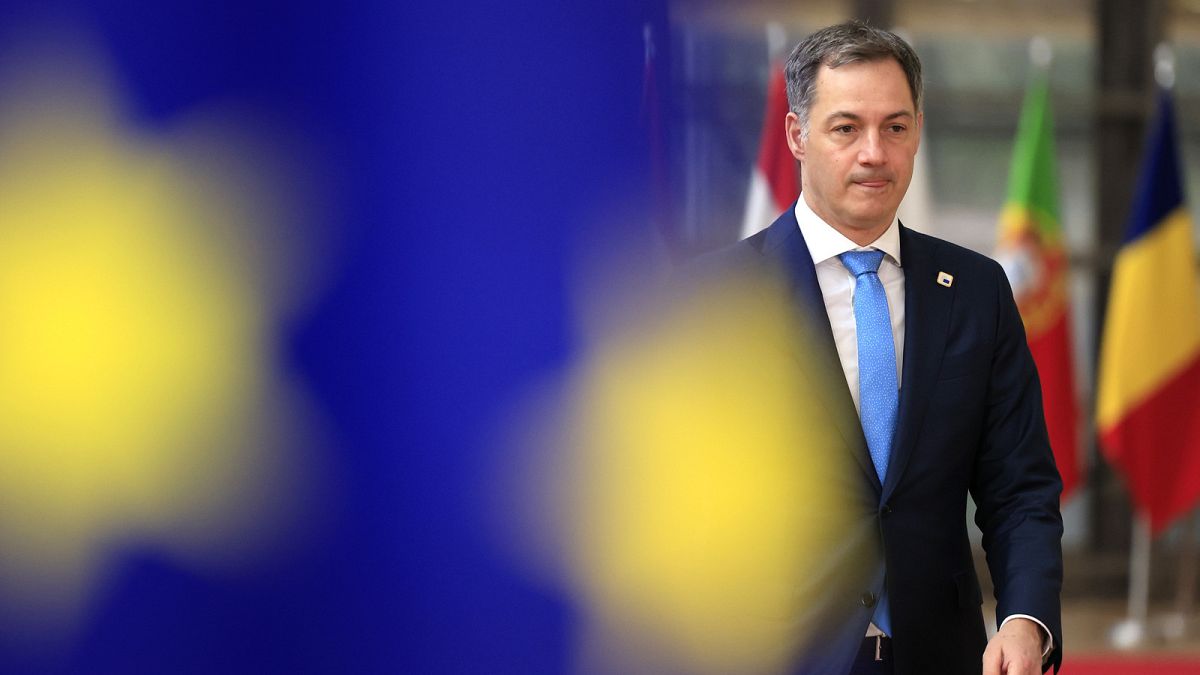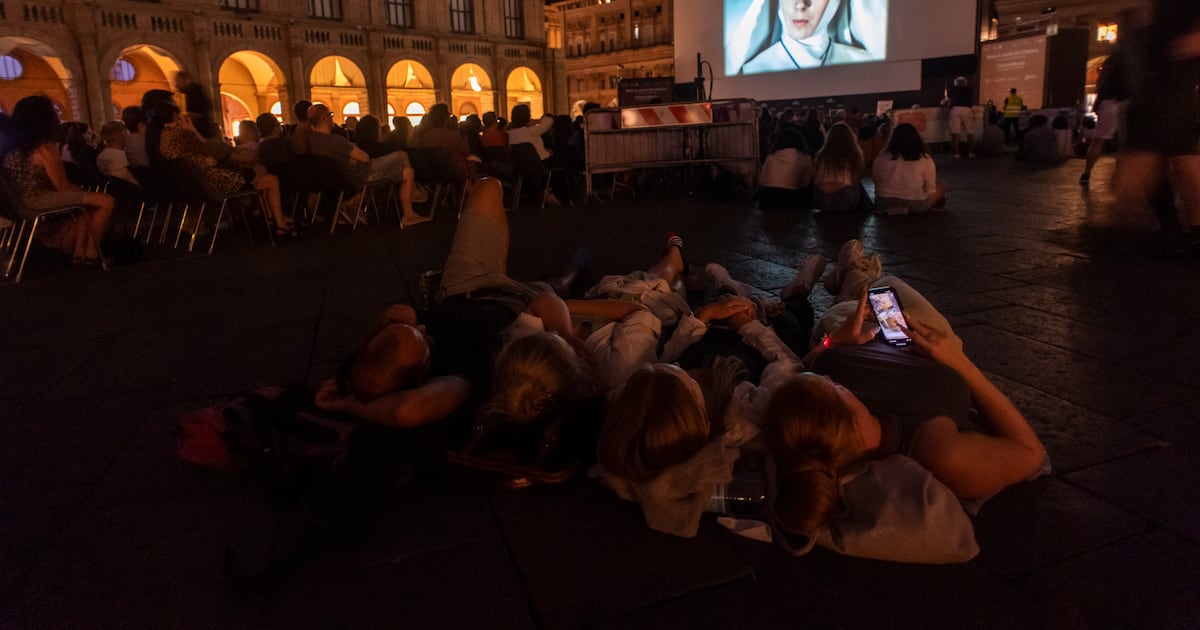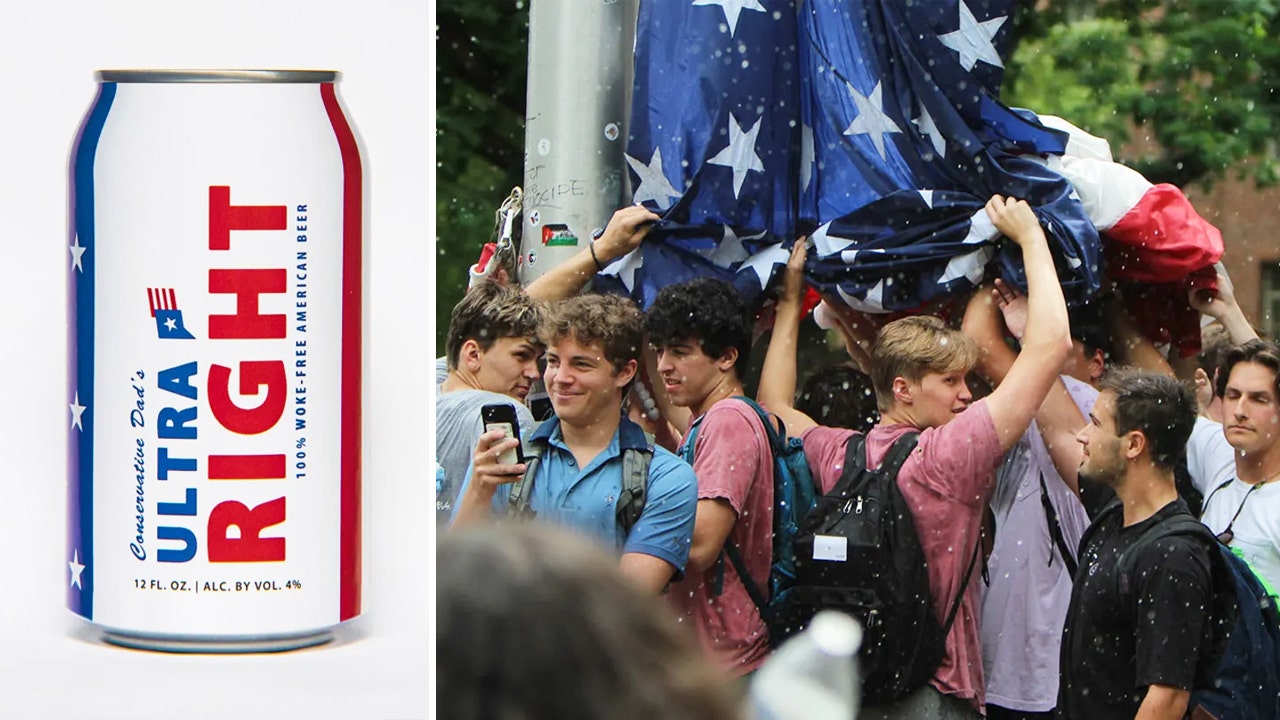World
MEPs grill Commissioners over 'background deal' with Viktor Orbán
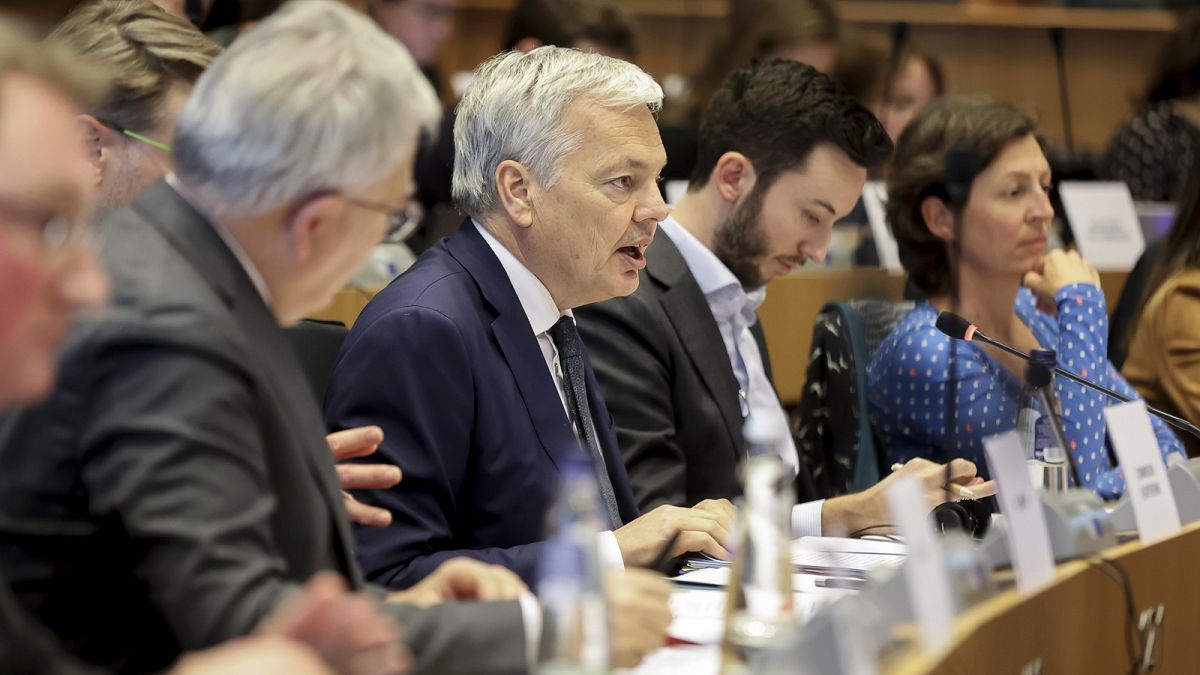
Members of the European Parliament spent Wednesday afternoon grilling three Commissioners over what they described as a “background deal” with Viktor Orbán to release frozen EU funds.
Commissioners Didier Reynders (Justice), Nicolas Schmit (Jobs) and Johannes Hahn (Budget) were questioned over the decision to unblock cash for Hungary, which the European Commission had previously paralysed over persistent rule-of-law concerns.
The main point of contention was the particular timing of the mid-December decision to release €10.2 billion in reaction to the judicial reform to decrease political interference that Budapest adopted,which was taken one day before a high-stakes summit of EU leaders.
The overhaul was designed to satisfy four “super milestones” that Brussels had imposed as a condition to resume payments and ensure proper oversight over taxpayers’ money.
The move infuriated the Parliament, who saw it as a capitulation to Orbán’s demands, a neglect of duty and an affront to fundamental rights. The hemicycle has threatened to launch legal action against the Commission if further funds are unblocked.
Prior to the summit, Orbán had spent weeks openly saying he would veto the opening of accession negotiations with Ukraine and a €50-billion special facility to provide Kyiv with reliable financial support until 2027. The belligerent tone raised the alarm in Brussels and fuelled speculation the meeting would turn into an embarrassing fiasco for the bloc. In the end, Orbán agreed to the accession talks but derailed the €50-billion plan.
In their interventions, MEPs argued the Commission had rushed to green-light the €10.2 billion just mere hours after Hungary published the remaining piece of the judicial reform in its official journal. The extremely tight timeline, they said, made it all but impossible to properly examine the new law and its compliance with the “super milestones.”
“Coincidentally, it was right before the summit,” said Eider Gardiazábal, from the socialists. “Normally, coincidences are not that coincidental.”
“Of course it was political,” Moritz Körner, from the liberal group, argued. “Orbán had to be won over.”
“In politics, everything is always as it seems to be,” Finnish MEP Petri Sarvamaa said.
Katalin Cseh, a Hungarian politician whose party Momentum is in the opposition, delivered a stinging rebuke, accusing the Commission of ignoring the “warning signals” that Hungarian and international experts had sent about the shortcomings and loopholes of the judicial reform.
“The time necessary to scrutinise the law was just simply not there,” Cseh said. “This was all part of a background deal. Obviously, the Commission could not properly monitor the implementation, which was also a requirement.”
Facing an onslaught of criticism, the three Commissioners stuck to the line that Hungary had provided sufficient evidence to demonstrate compliance with the four “super milestones,” which included measures to strengthen the National Judicial Council, a self-governing supervisory board, and crack down on political meddling inside the Supreme Court.
“The Commission was under legal obligation to take a decision,” Reynders said.
Schmit noted that the December decision did not “automatically” trigger a €10.2-billion payment to Budapest but only the possibility to request reimbursements for development projects carried out on the ground. So far, only €485 million has been wired, he added.
The trio reminded the room that, as of today, the Commission is still withholding nearly €12 billion from Hungary’s allocated share of cohesion funds and most of its €10.4-billion recovery and resilience plan, as Budapest has failed to meet the other milestones related to issues such as conflicts of interests, LGBTQ+ rights and academic freedom.
But according to MEPs’ estimations, under the regulation that governs cohesion funds, the Commission could have waited an additional nine days to approve the release of funds. Doing so, they said, would have allowed a longer time to examine the legislation and avoid the eyebrow-raising coincidence with the summit.
Lawmakers also complained the executive fast-tracked its rubberstamp on the judicial reform without waiting to see its practical effects on the courts and magistrates.
“The big question here is: has there been an actual assessment of progress on the independence of the judiciary in Hungary? Or was there a political deal to get rid of Orbán’s veto?” said Daniel Freund, from the Greens.
“You wanted this out the door before leaders met,” he added.
Dimitrios Papadimoulis, from the Left, criticised the Commission for creating the impression of “succumbing” to Orbán, who has repeatedly asked for the entire pot of cash to be unfrozen, and gaining nothing in return, given the €50-billion facility for Ukraine remains stuck in negotiations, despite Kyiv’s urgent need for support.
“Issues of the rule of law are far too important to be involved in such bargaining,” Papadimoulis told the room.
Reynders fought back, saying all the elements of the judicial reform had been thoroughly negotiated between Brussels and Budapest, meaning the Commission knew “very well” the content of the laws before their publication in the official journal.
“Your answers seem like Teflon,” Monika Hohlmeier, the conservative who chairs the parliament’s budget control committee, said. “What I’m missing here is actual facts.”

World
What a judge's gag order on Trump means in his hush money case
NEW YORK (AP) — Virtually every day of his hush money criminal trial, former President Donald Trump talks about how he can’t talk about the case.
A gag order bars Trump from commenting publicly on witnesses, jurors and some others connected to the matter. The New York judge already has found that Trump, the presumptive Republican nominee for president, repeatedly violated the order, fined him $9,000 and warning that jail could follow if he doesn’t comply.
But the order doesn’t stop Trump from talking about the allegations against him or commenting on the judge or the elected top prosecutor. And despite a recent Trump remark, it doesn’t stop him from testifying in court if he chooses.
As he fights the felony charges against him while running for president, Trump has at times stirred confusion about what he can and can’t do in the case. He has pleaded not guilty.
So what does the order do, what doesn’t it and where did it come from?
WHAT IS A GAG ORDER?
Generally speaking, a gag order is a judge’s directive prohibiting someone or people involved in a court case from publicly commenting about some or all aspects of it. In Trump’s case, it’s titled an “Order Restricting Extrajudicial Statements,” with “extrajudicial” meaning outside of court.
Gag orders, particularly in high-profile cases, are intended to prevent information presented outside a courtroom from affecting what happens inside.
Trump also is subject to a gag order in his federal criminal election interference case in Washington. That order limits what he can say about witnesses, lawyers in the case and court staff, though an appeals court freed him to speak about special counsel Jack Smith, who brought the case.
In his recent New York civil fraud trial, Trump was fined a total of $15,000 for comments he made about that judge’s law clerk after a gag order barred participants in the trial from “posting, emailing or speaking publicly” about the court’s staff.
The U.S. Supreme Court has acknowledged that gag orders can pit fair trial rights against free speech rights. The court has struck down some orders that barred the press from reporting on certain cases or court proceedings and rejected as too vague a Nevada court rule that limited what all lawyers could say out of court.
IS TRUMP FIGHTING THE GAG ORDER?
Yes. Before the trial, he asked a state appeals court to postpone the trial while he appeals the gag order, but the court refused. His appeal of the order itself is ongoing.
WHO IS COVERED BY THE GAG ORDER ON TRUMP?
Initially imposed March 26, the gag order bars Trump from making or directing others to make public statements about any juror and about any “reasonably foreseeable” witness’ participation in the investigation or the trial.
It also bars any statements about lawyers in the case, court staffers, prosecution aides and relatives of all of the above, to the extent that the statements are intended to “materially interfere with, or to cause others to materially interfere with” their work on the case “or with the knowledge that such interference is likely to result.”
The order doesn’t apply to Judge Juan M. Merchan or to Manhattan District Attorney Alvin Bragg, whose office is bringing the case. It does apply to comments about their family members, however. Merchan added that provision on April 1 after Trump lashed out on social media at the judge’s daughter, a Democratic political consultant, and made a claim about her that was later repudiated by court officials.
Trump is also allowed to talk about his political opponents, as Merchan made clear on Thursday.
The order also doesn’t bar witnesses from commenting on Trump. Michael Cohen, Trump’s ex-lawyer and an expected witness, has routinely attacked his former boss, leading Trump to complain about not being able to respond in kind.
CAN TRUMP TESTIFY?
Yes. The U.S. Supreme Court has held that criminal defendants have a constitutional right to take the stand in their own defense — or not to.
There was some confusion after Trump said Thursday that because of the gag order, he was “not allowed to testify.” In context, it appeared he was actually referring to his ability to respond to a reporter’s court-hallway question about a witness’ testimony that afternoon.
Trump clarified to reporters Friday that he understood the order wasn’t a bar on testifying. Merchan emphasized the same in court.
“I want to stress, Mr. Trump, you have an absolute right to testify at trial, if that’s what you decide to do after consultation with your attorneys,” Merchan said.
WHY DID TRUMP GET FINED? WHAT CAN’T HE SAY?
Merchan found that Trump violated the gag order with social media posts that laid into Cohen. Among the offending posts: one that asked whether “disgraced attorney and felon Michael Cohen been prosecuted for LYING,” a repost of a New York Post article that described Cohen as a “serial perjurer,” and a Trump post referring to Fox News host Jesse Watters’ claim that liberal activists were lying to infiltrate the jury.
Merchan noted that Trump’s comment on the Watters segment misstated what the host had actually said, making the comment “the words of Defendant himself.”
On the other hand, Merchan declined to sanction Trump for an April 10 post that referred to Cohen and Stormy Daniels, the porn performer who got a $130,000 hush money payment that’s at the heart of the case, as “sleaze bags.”
Trump contended that he was responding to previous comments by Cohen, and the judge said the back-and-forth gave him pause as to whether that post met the bar for a violation.
COULD TRUMP REALLY GO TO TO JAIL OVER THE GAG ORDER?
When Merchan fined Trump $1,000 apiece for nine violations — the maximum fine allowed by law — he wrote that “jail may be a necessary punishment” for some wealthy defendants who won’t be deterred by such a sum.
Merchan added that he “will not tolerate continued willful violations” of the gag order and that, if “necessary and appropriate,” he “will impose an incarceratory punishment,” meaning jail.
It’s unclear what would rise to the level of “necessary and appropriate.”
Defense lawyer Todd Blanche indicated in court Friday that he plans to appeal the judge’s finding this past week that Trump violated the gag order.
Prosecutors have asked Merchan to hold Trump in contempt again and fine him $1,000 for each of four alleged violations from April 22-25. But the prosecution isn’t asking for the former president to be locked up over those comments because they happened before Merchan’s jail warning and because “we’d prefer to minimize disruption to this proceeding,” prosecutor Christopher Conroy said.
World
Fourth body found in search for US and Australian surfers who mysteriously vanished in Mexico

A fourth body has reportedly been discovered in a popular Mexican tourist area, where an American and two Australians vanished last week while on an apparent camping and surfing trip, the local prosecutor’s office said in a statement late on Friday.
American Jack Carter Rhoad, 30, as well as Australian brothers Callum Robinson, 33, and Jake Robinson, 30, were last seen on April 27, the Baja California state prosecutor’s office previously announced. They did not show up at their planned accommodation last weekend.
Investigators discovered three bodies dumped in a pit while searching for the trio on Friday, although officials have not confirmed if the bodies are those of the missing men.
The fourth body was found nearby, the New York Post and other outlets reported. It’s unclear if it’s connected to the other three.
2 AMERICANS FOUND DEAD IN HOTEL ROOM IN MEXICO’S BAJA CALIFORNIA
Australian brothers Callum Robinson and Jake Robinson, top left, and US citizen Jack Carter Rhoad, right, who are missing in Mexico. (Reuters)
Forensic tests on the remains will be conducted by a state laboratory, which will allow for positive identification of the bodies, the prosecutor’s office said in its statement.
Investigators continue to search the rugged area where the bodies were found for additional evidence, the statement added.
The bodies were found in a rugged hillside area in the Mexican state of Baja California near the popular tourist town of Ensenada, about 90 minutes south of the U.S.-Mexico border. Video from the scene shows rescuers installing ropes to enter the pit where the bodies were discovered. The site is cordoned off by police, while a navy boat was also visible in the sea nearby.
The site where the bodies were discovered near the township of Santo Tomás, was near the remote seaside area where the missing men’s tents and the burned-out Chevrolet Colorado pickup truck were found Thursday on a remote stretch of coast.
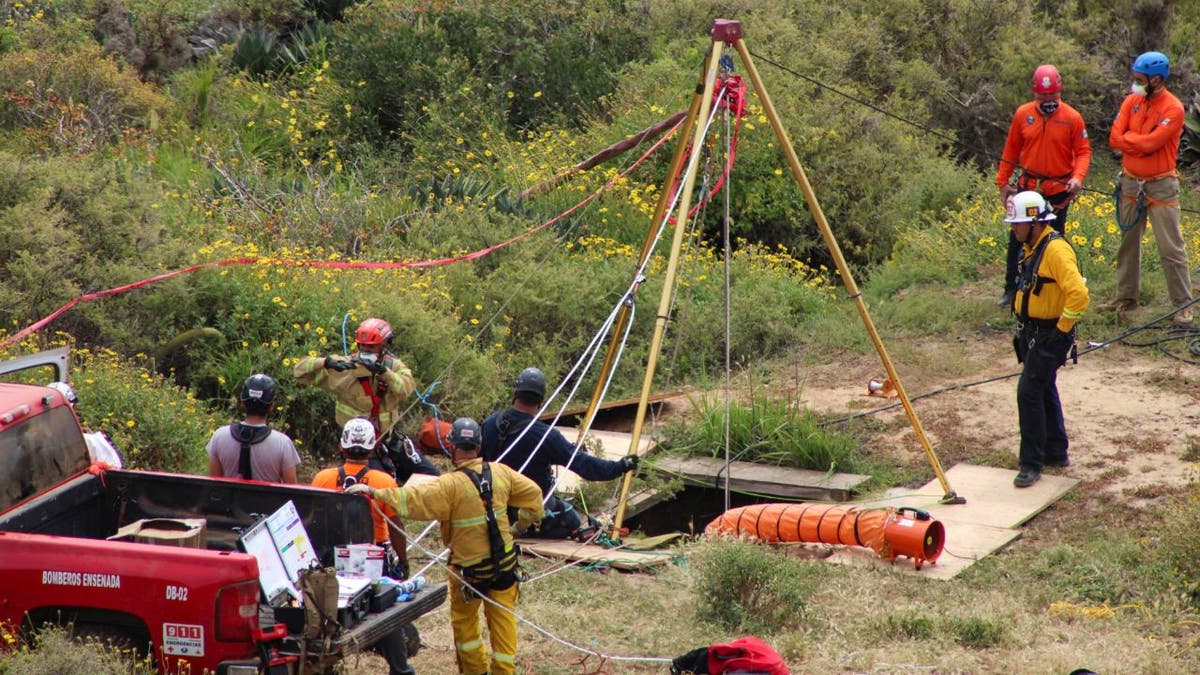
Members of a rescue team work at a site where three bodies were found in Baja California. The team have been looking for one American and two Australian tourists who have been reported missing. (Reuters)
It is unclear what types of injuries the victims suffered or how they died.
“There is a lot of important information that we can’t make public,” María Elena Andrade Ramírez, the chief state prosecutor said.
Baja California prosecutors said Friday that three people had been arrested and charged with a crime equivalent to kidnapping. It was unclear if they might face more charges.
Ensenada Mayor Carlos Ibarra Aguiar said in a news release that a 23-year-old woman had been detained with drugs and a cellphone that had a wallpaper photo of one of the missing men, The San Diego Union-Tribune reports. Officials didn’t specify how the three people were connected to the investigation, saying only that some were directly involved and others indirectly.
LUXURY RESORT SHUTTERS IN MEXICO’S BAJA CALIFORNIA AFTER MYSTERIOUS DEATHS OF 2 AMERICANS
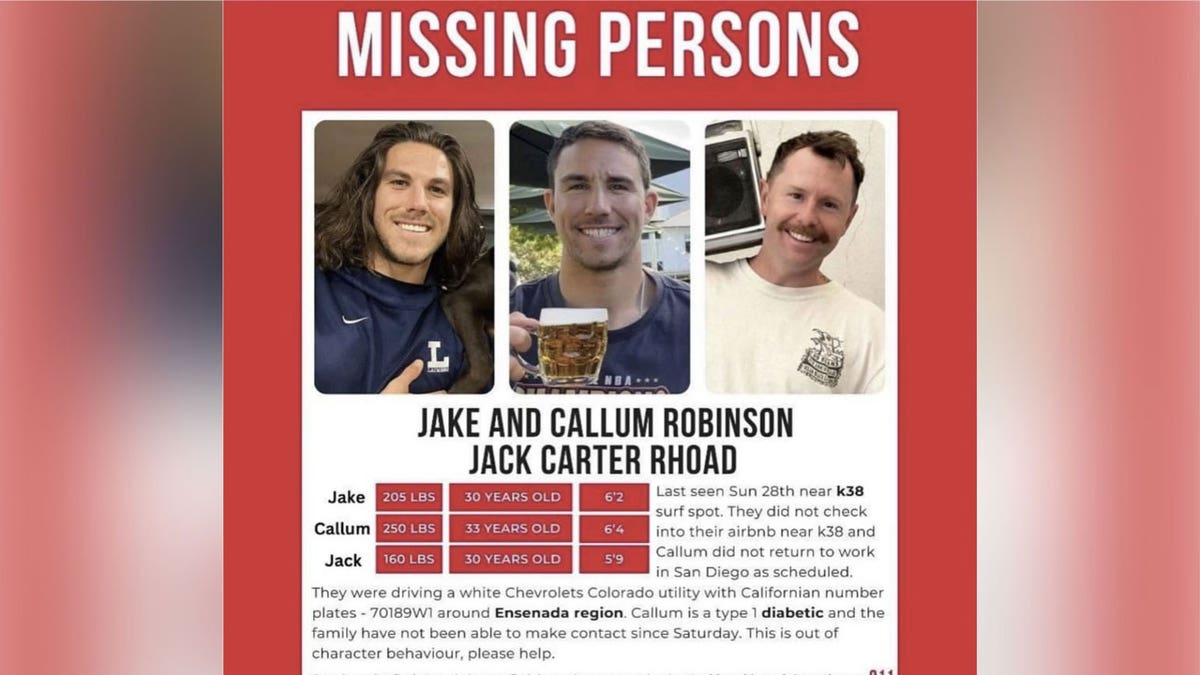
A missing persons’ poster of the trio was distributed earlier this week. (Reuters)
Investigators said that a missing persons report was filed 48 hours after the men were last seen, although the prosecutor’s office began investigating as soon as posts began circulating on social media.
María Elena Andrade Ramírez, the chief state prosecutor, said that while drug cartels are active in the area, she said, “all lines of investigation are open at this time. We cannot rule anything out until we find them.”
The Baja California Attorney General’s Office has said that it has maintained contact with the FBI and relatives of the victims, through consular agencies.
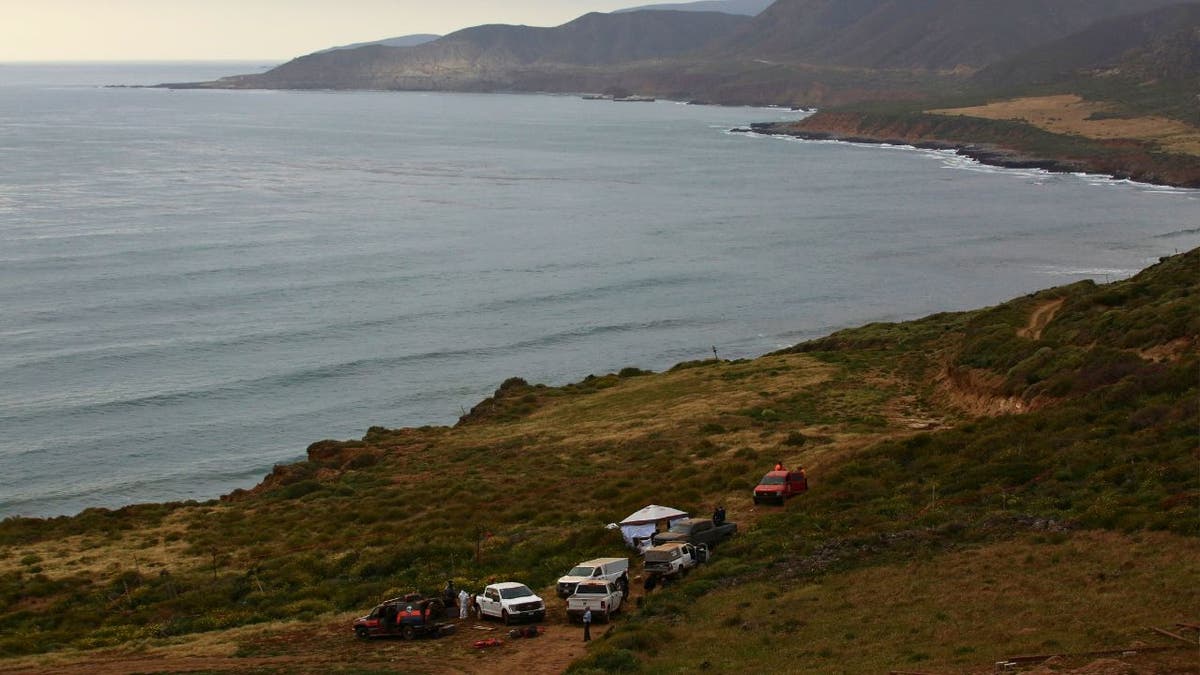
Members of a rescue team work at a site where three bodies were found in the state of Baja California where one American and two Australian tourists were reported missing.
On Wednesday, the missing Australians’ mother, Debra Robinson, posted on a local community Facebook page an appeal for help in finding her sons and noted that Callum is diabetic.
The Australian media reports that Jake is a doctor, while Callum lives in San Diego and is a member of Australia’s national lacrosse team.
The State Department’s travel advisory lists Baja California under its “reconsider travel” category due to crime and kidnapping.
In 2015, two Australian surfers, Adam Coleman and Dean Lucas, were killed in western Sinaloa state, across the Gulf of California — also known as the Sea of Cortez— from the Baja peninsula. Authorities say they were victims of highway bandits.
Reuters and The Associated Press contributed to this report.
World
German socialist candidate attacked before EU elections

Matthias Ecke, a member of Germany’s centre-left Social Democratic Party, was attacked on Saturday while out campaigning.
A candidate for Chancellor Olaf Scholz’s centre-left party in next month’s European Parliament election has been seriously injured while campaigning in eastern Germany, the party said on Saturday.
Matthias Ecke, a Social Democrats (SPD) candidate, was attacked while putting up political posters in Dresden on Friday evening, according to the party.
He was taken to hospital and required surgery for his injuries, it said.
Police said the 41-year-old was hit and kicked by four men and that the same group had apparently attacked a Green Party worker minutes before in the same street.
Interior Minister Nancy Faeser, also a Social Democrat, said if it’s proven that the assault on Ecke was politically motivated, it would represent “a serious attack on democracy.”
The attack was the latest in a series of incidents raising political tensions in Germany ahead of the European Parliament election.
Scholz’s SPD launched their official campaign for the 9 June vote with a rally last week in Hamburg, where the German leader grew up.
“We are experiencing a new dimension of anti-democratic violence,” Faeser said.
She promised “tougher action and further protective measures for the democratic forces in our country.”
Government and opposition parties say their members and supporters have faced a wave of physical and verbal attacks in recent months and have called on police to step up protection for politicians and election rallies.
Many of the incidents have occurred in the former communist east of the country, where the far-right Alternative for Germany party (AfD) is expected to make gains in the European elections and upcoming votes in Germany.
Last week, the car carrying the vice-president of the German parliament, Katrin Goering-Eckardt of the Greens, was surrounded for nearly an hour by protesters as she tried to leave a rally.
The opposition Christian Democrats and the Left party say their workers have also faced intimidation and seen their posters ripped down.
Mainstream parties accuse the AfD of links to violent neo-Nazi groups and of fomenting an increasingly harsh political climate. A prominent AfD leader, Bjoern Hoecke, is currently on trial accused of using a banned Nazi slogan.
Germany’s domestic intelligence service has placed some chapters of the party under surveillance.
The branch of the Social Democrats in Saxony state, where Ecke is their lead candidate for the European elections, said their campaign would go on despite “fascist methods” of intimidation.
“The seeds that the AfD and other right-wing extremists have sown are germinating,” the branch leaders, Henning Homann und Kathrin Michel, said in a joint statement. “These people and their supporters carry responsibility for what is happening in this country.”
-

 News1 week ago
News1 week agoFirst cargo ship passes through new channel since Baltimore bridge collapse
-

 World1 week ago
World1 week agoHaiti Prime Minister Ariel Henry resigns, transitional council takes power
-

 Movie Reviews1 week ago
Movie Reviews1 week agoAbigail Movie Review: When pirouettes turn perilous
-

 World1 week ago
World1 week agoEU Parliament leaders recall term's highs and lows at last sitting
-

 Politics1 week ago
Politics1 week ago911 call transcript details Democratic Minnesota state senator’s alleged burglary at stepmother's home
-

 Science1 week ago
Science1 week agoOpinion: America's 'big glass' dominance hangs on the fate of two powerful new telescopes
-

 Politics1 week ago
Politics1 week agoGOP lawmakers demand major donors pull funding from Columbia over 'antisemitic incidents'
-

 World1 week ago
World1 week agoHamas ‘serious’ about captives’ release but not without Gaza ceasefire



